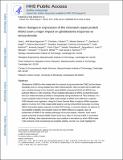Minor Changes in Expression of the Mismatch Repair Protein MSH2 Exert a Major Impact on Glioblastoma Response to Temozolomide
Author(s)
Sangaraju, D.; Tretyakova, N.; McFaline, Jose Luis; Stanciu, Monica; Nagel, Zachary D.; Mazzucato, Patrizia; Cerniauskas, Edvinas; Barford, Kelly; Vargas, Amanda; Chen, Yimin; Lees, Jacqueline; Hemann, Michael; Samson, Leona D; Braun, Christian Joerg; White, Forest M.; ... Show more Show less
DownloadHemann_Minor changes.pdf (1.665Mb)
OPEN_ACCESS_POLICY
Open Access Policy
Creative Commons Attribution-Noncommercial-Share Alike
Terms of use
Metadata
Show full item recordAbstract
Glioblastoma (GBM) is often treated with the cytotoxic drug temozolomide, but the disease inevitably recurs in a drug-resistant form after initial treatment. Here, we report that in GBM cells, even a modest decrease in the mismatch repair (MMR) components MSH2 and MSH6 have profound effects on temozolomide sensitivity. RNAi-mediated attenuation of MSH2 and MSH6 showed that such modest decreases provided an unexpectedly strong mechanism of temozolomide resistance. In a mouse xenograft model of human GBM, small changes in MSH2 were sufficient to suppress temozolomide-induced tumor regression. Using The Cancer Genome Atlas to analyze mRNA expression patterns in tumors from temozolomide-treated GBM patients, we found that MSH2 transcripts in primary GBM could predict patient responses to initial temozolomide therapy. In recurrent disease, the absence of microsatellite instability (the standard marker for MMR deficiency) suggests a lack of involvement of MMR in the resistant phenotype of recurrent disease. However, more recent studies reveal that decreased MMR protein levels occur often in recurrent GBM. In accordance with our findings, these reported decreases may constitute a mechanism by which GBM evades temozolomide sensitivity while maintaining microsatellite stability. Overall, our results highlight the powerful effects of MSH2 attenuation as a potent mediator of temozolomide resistance and argue that MMR activity offers a predictive marker for initial therapeutic response to temozolomide treatment.
Date issued
2015-08Department
Massachusetts Institute of Technology. Center for Environmental Health Sciences; Massachusetts Institute of Technology. Department of Biological Engineering; Massachusetts Institute of Technology. Department of Biology; Koch Institute for Integrative Cancer Research at MITJournal
Cancer Research
Publisher
American Association for Cancer Research
Citation
McFaline-Figueroa, J. L. et al. “Minor Changes in Expression of the Mismatch Repair Protein MSH2 Exert a Major Impact on Glioblastoma Response to Temozolomide.” Cancer Research 75.15 (2015): 3127–3138.
Version: Author's final manuscript
ISSN
0008-5472
1538-7445